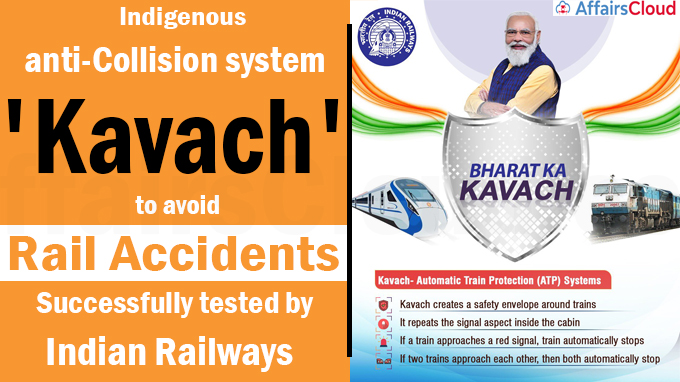 On March 4, 2022, The indigenously-developed India’s first Train Collision Avoidance System (TCAS), “Kavach” was successfully tested by Indian Railways. The test was conducted between Gullaguda-Chitgidda Railway stations on Lingampalli-Vikarabad section in Secunderabad Division of South Central Railway while onboard the locomotive, Union Minister Ashwini Vaishnaw, Ministry of Railways; and Vinay Kumar Tripathi, Chairman and Chief Executive Officer (CEO) of Railway Board .
On March 4, 2022, The indigenously-developed India’s first Train Collision Avoidance System (TCAS), “Kavach” was successfully tested by Indian Railways. The test was conducted between Gullaguda-Chitgidda Railway stations on Lingampalli-Vikarabad section in Secunderabad Division of South Central Railway while onboard the locomotive, Union Minister Ashwini Vaishnaw, Ministry of Railways; and Vinay Kumar Tripathi, Chairman and Chief Executive Officer (CEO) of Railway Board .
- This system will help the Railways achieve the goal of ‘zero accidents’ as it enables the trains to stop on their own if the digital system notices any manual error like jumping of the red signal or any other malfunction.
How Trial was conducted?
i.During the trial, Head-on-collision situation was created as both the locomotives were moving towards each other. The ‘Kavach’ system initiated the automatic braking system and halted the locomotives 380 metres apart.
ii.The speed restriction of 30 Kmph was also tested when the locomotive was run on loop line.
- Kavach automatically reduced the speed to 30 Kmph from 60 Kmph as the locomotive entered the loop line.
About KAVACH:
i.Announced in the 2022 Union Budget as a part of the Atmanirbhar Bharat initiative, it is an indigenously developed ATP (Automatic Train Protection) system by Research Design and Standards Organisation (RDSO) in collaboration with Indian industry.
- Its trials are facilitated by South Central Railway.
ii.Automatic braking system: It is an electronic system of Safety Integrity Level – 4 standards (SIL-4). It provides protection by preventing trains to Signal Passing at Danger (SPAD) and avoiding collision as it activates the train braking system automatically if the driver fails to control the train as per the speed restrictions.
iii.Cheapest SIL-4 Tech: It is one of the cheapest, Safety Integrity Level 4 (SIL-4) certified technologies with the probability of error is 1 in 10,000 years.
- Once implemented, it will cost approximately Rs 40 lakh per kilometre to operate compared to about Rs 2.5 crore worldwide.
iv.It provides Continuous update of Movement Authority with display of signal aspects in Driver Machine Interface (DMI) / Loco Pilot operation cum Indication Panel (LPOCIP), along with SoS Messages during emergency situations and Centralized live monitoring of Train movements through Network Monitor System.
How will Kavach be deployed?
As a part of Atmanirbhar Bharat, 2,000 km of network will be brought under Kavach for safety and capacity augmentation in 2022-23. Around 34,000 Kms of network will be brought under Kavach.It is set for countrywide implementation by taking up 4,000-5,000 km each year.
96% of railway Traffic is carried on Indian Railway High Density Network and Highly Used Network routes. To transport this traffic safely, KAVACH works are being taken up in a focused manner as per following priority set by the Railway Board.
First Priority: High Density Routes and New Delhi (Delhi)- Mumbai (Maharashtra) & New Delhi – Howrah (West Bengal) Sections for 160 Kmph with Automatic Block Signaling & Centralized Traffic Control.
Second Priority: On the Highly Used Networks with Automatic Block Signaling & Centralized Traffic Control.
Third Priority: On other Passenger High Density Routes with Automatic Block Signaling.
Fourth Priority: All other routes.
Recent Related News:
The Indian Railways launched a new ‘Operation Mission Amanat’ initiative to track lost luggage of the passengers. The Railway Protection Force (RPF) of Western Railway will help in getting back the lost luggage. It will ensure more safety and security of luggage and belongings of the passengers.
About Indian Railways:
Indian Railways was nationalized in 1951. It is the largest rail network in Asia and the world’s second-largest under one management.
Headquarters-New Delhi, Delhi




